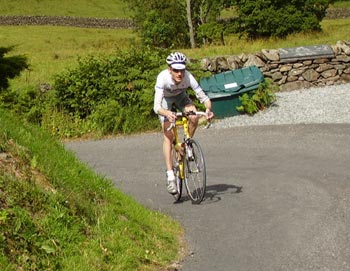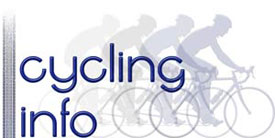
These days interval training is very popular. It also has the advantage that in theory, you can get quick with a relatively short amount of training time. In the last part of my interviews with former pro, Flavio Zappi, I asked him about his approach to training.
It was an interesting answer, perhaps not what I expected. Whether it would work for everyone is a matter of debate. But, I should point out that Flavio went from 4th to 1st cat in his first season racing after a 25 year lay off. He gained quite a few victories and many 2nd places. His training with lack of intervals is working well for him.
How do you approach training?
In my last year as a professional cycling. It was the first time in history of cycling a coach was doing intervals. His name is (Assasi). Year before, 1984, he was training Francesco Moser. (Although Moser told me later he didn’t actually do much. It was just for sponsorship)
So that year we did a lot of strange of intervals like big gears on longer climbs. There were 15 of us. In the previous year, we were going really well. But, that year after doing intervals, only 3 finished tour of Italy. Basically we had worse season ever. We all lost our job. only 3 found a contract next year. Basically we became like strong weightlifters but nothing to push on a bike, no speed. The guy changed a lot afterwards. he now runs a very famous training scheme. Cadel Evans is one of his clients now. But, he changed alot.
But, I’m very sceptical about intervals. I think probably good for time trials and track and speed. But, for road racing I’m sceptical because road racing is a mixture of everything. You are climbing maybe 1 min, 3 min maybe 50 minutes. Very difficult to train, unless you want to train for one particular side.
Everyone is trying to convince me the best thing to do is intervals. I’m still thinking about. On one side there is the mental stress. To win a race, you really have to be focused on the race and fresh in the mind. You can have the best legs in the world, but, if you don’t have the right mind, you are not going to win. It happened to me. The last thing I want to do is to go out and ride 6 intervals and then after 3 you think ‘O know, not another 3 to do’. I’d rather ride as we did the other day go up and down Boars Hill seven times but then you go a little bit slow and have a little bit time to chat time to enjoy. So the hammering is part of the fun and not just pain. And when you road race you don’t have a set time for what you need to develop.
It’s like if you want to polish the wheels on the car, you need to have a good engine first. There’s no point in polishing the wheels until you have a good engine.
Intervals is like that. Before you do intervals you need to make sure you can ride for 3 to 4 hours at a good speed. That’s my old fashioned style.
Q. How long do you get to train these days?
These days I’m doing what I can with my job. But, I’m riding most days.
When I’m racing, I’m normally racing on Sunday and a Criterium on Thursday. So I have my speed training, my race and 4 days left to do easy rides to make sure I am recovering properly. It is very important to eat properly, sleep well, massage or stretching. I still like to have massage rather than stretch.
I will keep doing intervals, but, it’s a good point that even intervals should be good fun. When intervals become boring and something to dread, it is time to try a different approach. Whatever kind of cycling you are doing, mental freshness and a sense of enjoyment is important.
Related Books on Cycle Training
Serious Cycle Training at Amazon.co.uk
Cyclist’s Training Bible – Joe Friel



Leave a Reply